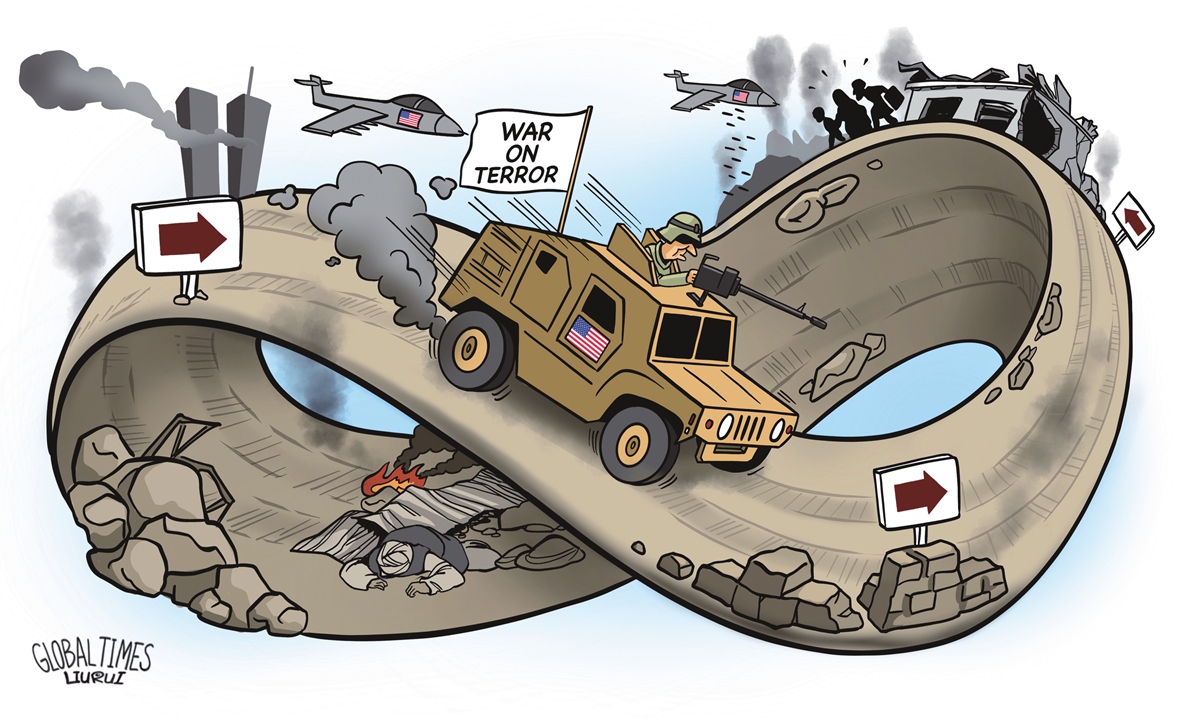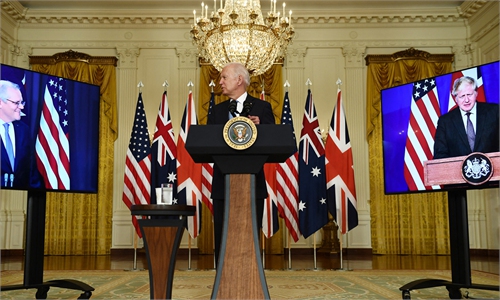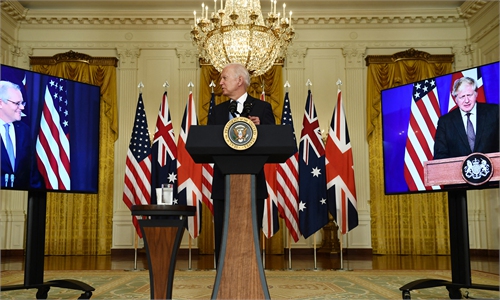
Illustration: Liu Rui/GT
Vladimir Lenin, late leader of Soviet Union, once argued that imperialist wars are absolutely inevitable under monopolist capitalism. The view is still of great significance to our understanding of the US today.
According to media reports, the US and the UK will support an Australian push to purchase nuclear-powered submarines. This has aroused strong reactions in the Asia-Pacific region. Many countries are worried this will break the nuclear power balance in the region, and undermine ASEAN's effort to turn the entire region into a nuclear-free zone. Australia's weapons purchase may intensify the arms race.
But the US, or more precisely, US arms dealers, will be pleased to see the last point coming into being. Wherever there are arms competitions in any parts of the world, more US weapons will be purchased.
The arms industry directly serves the military. And the military of the empire is not only for the maintenance of defense, but also for the purpose of expansion and conquest of the world. Meanwhile, such industries in the US have absolute advantages.
To begin with, the post-World War II security system was established under the leadership of the US. Washington has a final say in terms of whether to launch a war today. Second, after years of accumulated strength in research and development, the US arms industry is in leading other players in many fields. Third, once a country adopts US weapons and equipment, it means the country puts itself in the US system. It won't be an easy task to make changes in such a defense system in the future. Since the end of the WWII, quite a few emerging economies have become US fixed clients. Some are stuck with US defense systems, and are part of the US' research and development projects.
The US military industry did contribute to the defeat of fascism in WWII. But its growth and development in the postwar period has become deeply intertwined with US global strategy. It serves and influences that strategy.
The military industry is the core of the existing manufacturing industry in the US. Most of the manufacturing industry revolves around the survival and development of military industry and its supplies. This part of the industry is estimated to account for more than 60 percent of the total US manufacturing industry.
The US arms industry is in an indispensable position in US export system. According to official US data, US arms exports totaled $175.08 billion in 2020, up 2.8 percent over 2019. The Stockholm International Peace Research Institute's Arms Industry Database noted that sales of arms and military services by the sector's largest 100 companies totaled $420 billion in 2018, in which arms sales of US companies accounted for 59 percent.
Although the US aerospace and defense industry takes up merely 1.8 percent of its total GDP, the role this industry plays in pulling the US economy is significant. Moreover, the US arms market is not a free one. Instead, it is a market with a long-term and stable guarantee from the government.
Wars and threats, the defense industry, and the strength of the US are interdependent. To weaken the US defense industry would be to weaken the backbone of the US economy and undermine the strength of the so-called American empire.
Thus, a starting point for Washington's global strategy is to either seek out opportunities, set up hostile targets to create tensions, or to intervene directly with arms. There are times when you really don't know whether it's Washington or the US arms dealers who are making the decisions.
After the war in Afghanistan, some elites in the US said that the main reason for the country's failure in Afghanistan was the lack of its capabilities. In fact, Americans said the same thing after being defeated in the Vietnam War.
Since Americans have long recognized that their ability to transform or conquer the world is limited, why do they still frequently launch wars that eventually fail? One reason is that its defense industry is meant to make money off of war. It provides a constant source of power for the US to maintain its dominant to the world and make huge profits from the process.
The desire of arms dealers to get profited is constantly pushing Washington to keep pursuing war targets, creating tensions in some hot spots, and gaining profits by pulling in allies in a remote, proxy manner.
The defense industry in the US is perfectly combined with Washington's impulse to try to conquer the world with American values. As a result, a mutually supportive combination has been created.
As long as this combination remains the same, the US will never truly learn its lessons. The logic of the US empire will also make the country do things that it cannot and does not have the capacity to do. However, the only certain thing is that the empire will run out of its vigor in such a war.
The author is a senior editor with People's Daily, and currently a senior fellow with the Chongyang Institute for Financial Studies at Renmin University of China. dinggang@globaltimes.com.cn. Follow him on Twitter @dinggangchina



